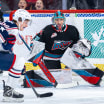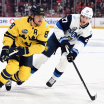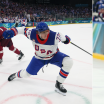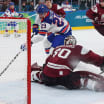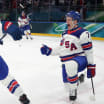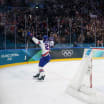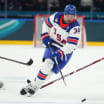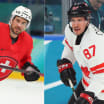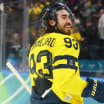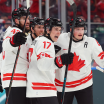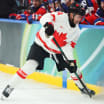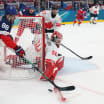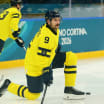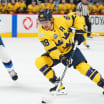NASHVILLE -- The Pittsburgh Penguins weren't supposed to be able to do it without Kris Letang, their best defenseman, their only defenseman who can play in all situations, against anybody, for however long coach Mike Sullivan wants him to play.
The Penguins' bid for a repeat Stanley Cup championship was thought to be over before it even began because Letang was ruled out for the entire 2017 Stanley Cup Playoffs on April 5. He had to have surgery to repair a herniated disc in his neck.
Simple-but-effective defense helped Penguins win Stanley Cup
Unsung group stepped up in Pittsburgh's run to second straight championship

Letang had that surgery, but he still had time to get healthy enough to join his teammates on the ice Sunday at Bridgestone Arena, in full uniform, equipment and all, for the celebration that capped one of the most improbable Stanley Cup runs in a long time.
RELATED: [Complete Stanley Cup Final coverage| SHOP: Penguins Championship Gear ]
The Penguins took a simple-equals-effective approach with their blue line and rode a group of defensemen without any flash but clearly enough substance to a second straight Stanley Cup championship. They finished it off with a 2-0 win in Game 6 of the Final against the Nashville Predators.
"That group of guys and what they're willing to do and what they bring it's all so important," captain Sidney Crosby said about the defensemen. "I could go through every guy, but they had to deal with that, they know the pressure that comes with losing a guy that plays 25-30 minutes and they weren't intimidated by it. They took it on. They proved what they're capable of."
What Brian Dumoulin, Ron Hainsey, Olli Maatta, Trevor Daley, Justin Schultz and Ian Cole did, and how they did it, is nothing short of remarkable.
Not since the Carolina Hurricanes in 2006 has a team won Stanley Cup without an All-Star or even a future Hall of Famer eating up minutes on the back end.
The Anaheim Ducks had Chris Pronger and Scott Niedermayer in 2007. The Detroit Red Wings had Nicklas Lidstrom in 2008. The Penguins had Sergei Gonchar in 2009. Duncan Keith and Brent Seabrook led the charge for the Chicago Blackhawks in 2010, 2013 and 2015.
Zdeno Chara did it for the Boston Bruins in 2011. Drew Doughty did it for the Los Angeles Kings in 2012 and 2014. Letang did it for the Penguins last season, when he averaged 28:52 of ice time in 23 games.
"Our defense group is, in a lot of ways, the unsung heroes of this team," Sullivan said before Game 6. "I think they fly under the radar for obvious reasons. We have a lot of dynamic forwards that make a lot of great plays through the course of games that a lot of times on a lot of nights become the story line, but this team doesn't have success if that group of defensemen doesn't play the way that they've played throughout the course of this playoffs."
Their success started with a philosophy set by Sullivan and assistant Jacques Martin, who is in charge of the defense. They didn't want to force one of the defenseman into trying to be Letang, into playing his role. Talk about a round peg into a square hole.
"There's no one else that could handle those kind of minutes," Martin said.
So they eschewed the normal coaching philosophy of looking for particular matchups, trying to get a certain defenseman or defense pair out against a certain line. Instead, they just rolled their pairs out one after the other.
Dumoulin and Hainsey got the top billing, but neither played more than 22 minutes per game.
Dumoulin averaged 21:59, including 26:08 on Sunday. It was only the second time in the playoffs that a Penguins defenseman played more than 25 minutes in a game decided in regulation. Dumoulin also did it in Game 2 of the Eastern Conference Final against the Ottawa Senators; coincidentally, he also finished that game with 26:08.
"Dumoulin is the one who got the most minutes because he's a good skater, he sees the play well, he moves the puck," Martin said.
Maatta averaged 20:06 per game and played in all 25 games. Daley, Maatta's primary partner, averaged 19:06 in 21 games. Schultz played 19:44 per game and took Letang's spot on the top power-play unit. Cole, his primary partner, played 18:50 per game.
Chad Ruhwedel (six games, 14:06 per) and Mark Streit (three games, 15:03 per) filled in when Schultz and Daley were out with injuries.
"That was the thing going into playoffs, we were just going to roll six, spread out the minutes, not overtax anyone," Schultz said. "We did that all playoffs and it worked."
There is no question that the Penguins could ask their defensemen to play simple because of the dynamic forwards they have, including Crosby, Evgeni Malkin, Phil Kessel and emerging rookie Jake Guentzel, who led all scorers in the playoffs with 13 goals.
"When we get it in their hands they can play fast and they're really dangerous," Maatta said.
That was the biggest key for the Penguins' defensemen. It wasn't about joining the rush to create a four- or five-man attack, although they did that at times. Their goal, their only goal, was to move the puck up to the forwards quickly, crisply and accurately.
"Those little things add up to helping a team win games," Sullivan said.
The Penguins won 16 games after many pundits didn't believe they could win four, or at least not eight, without Letang.
"To lose that caliber of player, you can't replace him so you wonder [if you can win without him]," Schultz said. "But we all sat there and said, 'We've got to step up.' Our forwards stepped up. Everyone stepped up. We got it done."
